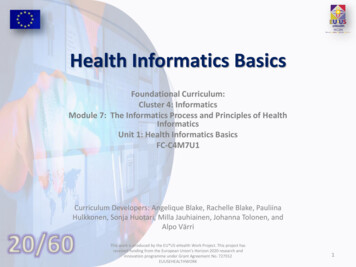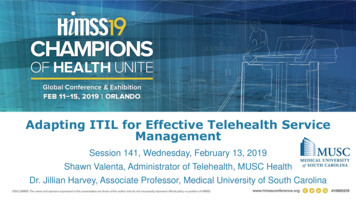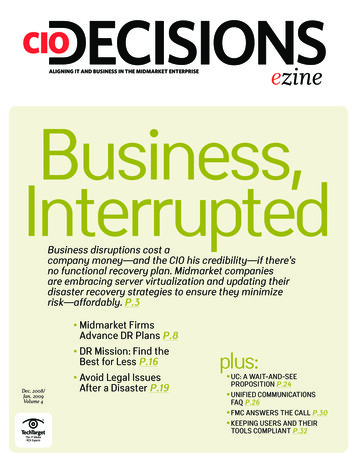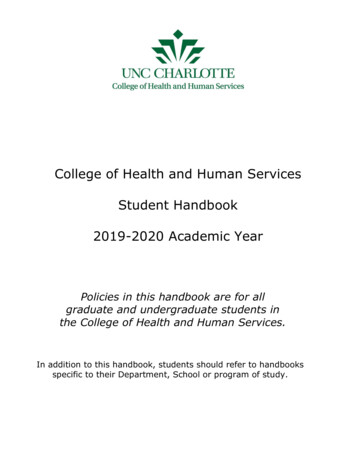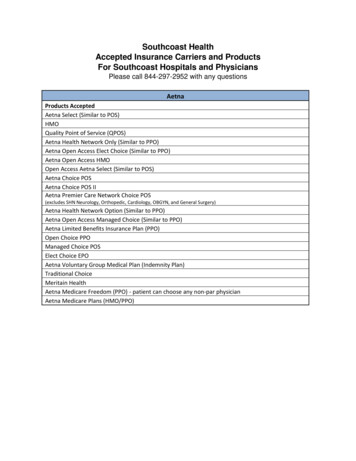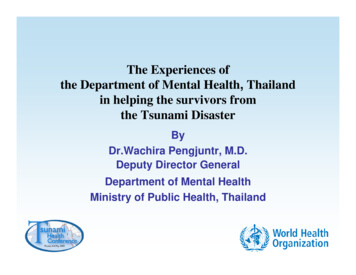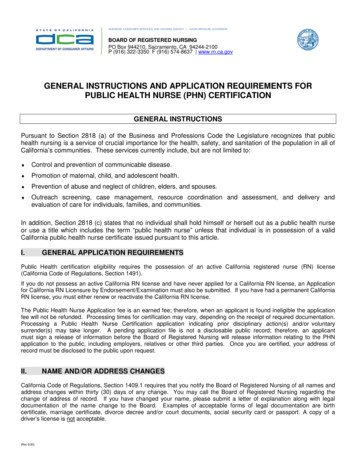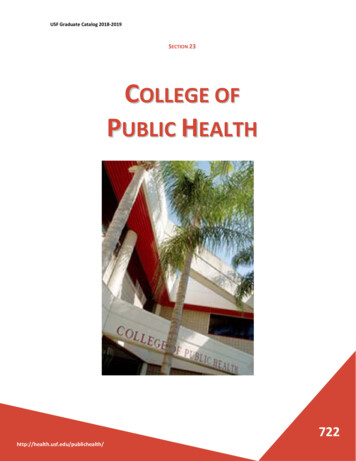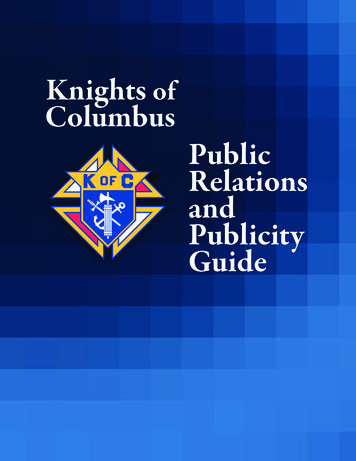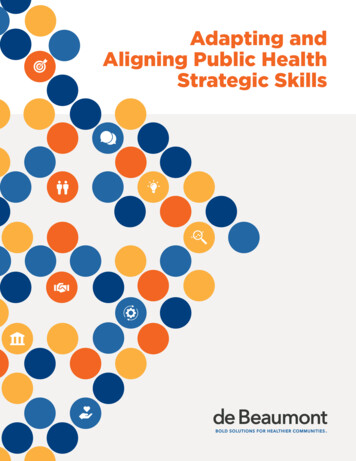
Transcription
Adapting andAligning Public HealthStrategic Skills
Table of Contents1Why Strategic Skills?2A Changing Field3Aligning to Address Change4Renewed Strategic SkillsThe Strategic Skills and Core Competencies10Driving Change in the Public Health WorkforceRecommendations for Workforce DevelopmentActions for Adopting Strategic Skills15Sustaining Momentum
AcknowledgmentsThis publication was written by Moriah Gendelman, MPH, Senior Research Associate; Samantha Cinnick, MPH, CHES,CPH, Program Officer, Workforce Development; and Grace Castillo, MPH, Program Associate, of the de BeaumontFoundation, with support from the de Beaumont Foundation’s program and communications teams. This report wasdesigned by Elizabeth Fowler of Collectively Creative.OTHER CONTRIBUTORSKathleen Amos, MLISAssistant Director, Academic/Practice LinkagesPublic Health FoundationRon Bialek, MPPPresidentPublic Health FoundationDorothy Cilenti, DrPH, MPH, MSWAssociate Professor, Department of Maternal and Child HealthGillings School of Global Public HealthHelen de Pinho, MBBCh, FCCH, MBAAssistant Professor, Population and Family HealthColumbia University Irving Medical CenterKatrina Forrest, JDCo-Executive DirectorCityHealthCarole L. (Carly) Hutchinson, PhD, MAAdjunct Assistant ProfessorDepartment of Sociomedical SciencesMailman School of Public HealthColumbia UniversityC. Benzel JimmersonFounder and Chief Strategy OfficerDiversity Dynamics Consulting LLCMetro DEEP (Diversity and Economic Equity Project)Jonathan P. Leider, PhDIndependent ConsultantCarolyn MullenSenior Vice President of Government Affairs & Public RelationsAssociation of State and Territorial Health OfficialsAbigail Ocampo Zapien, B.A. in Ethnic StudiesBilingual Advocate, Sister Carmen Community CenterSylvia Pirani, MPH, MSPublic Health Practice Advisor, HRSA FundedRegion 2 Public Health Training CenterRenata Schiavo, PhD, MA, CCLSenior Lecturer, Sociomedical Sciences, ColumbiaUniversity Mailman School of Public HealthEditor-in-Chief, Journal of Communication in Healthcare:Strategies, Media, and Engagement in Global HealthFounder and President, Board of Directors, Health EquityInitiativeKellie L. Teter, MPAMaternal Child Health Program ManagerDenver Public HealthKaren Trierweiler, MS, CNM (ret)Founding PartnerTotal Population HealthElizabeth Yoder, MPHProgram Manager of EpidemiologyClay County Public Health CenterChristina R. Welter, DrPH, MPHDirector, DrPH in LeadershipAssociate Director, Policy, Practice, and PreventionResearch CenterClinical Assistant Professor, Health Policy andAdministrationUniversity of Illinois at Chicago, School of Public HealthEmily Yu, MBAExecutive DirectorBUILD Health ChallengeSUGGESTED CITATIONde Beaumont Foundation. “Adapting and AligningPublic Health Strategic Skills,”. March 2021. https://debeaumont.org/strategic-skills/The de Beaumont Foundation creates and invests in bold solutions that improve the health of communities acrossthe country. Its mission is to advance policy, build partnerships, and strengthen public health to create communitieswhere people can achieve their best possible health.
Why Strategic Skills?This past year, the public health workforce has been faced with immensechallenges. The COVID-19 pandemic proved how the health of the public isdeeply connected to our economy, education system, social support systems,and much more.In combination with the protests against systemic racism during the summer of2020, the pandemic has made abundantly clear that we will never achieve healthequity without racial equity. Now more than ever, the public health workforcerequires skills that span public health disciplines and increase the scope of publichealth.Since the release of the first set of Strategic Skills in 2017, the public health field andits work have evolved. To address new challenges and changing priorities, the deBeaumont Foundation sought to align the Strategic Skills with widely used publichealth assessments and competency sets. The resulting renewed Strategic Skillspresented in this report address the new challenges and the constantly shifting focusof the workforce.Using the Strategic Skills framework as a basis for workforce development, all publichealth professionals working to advance the 10 Essential Public Health Servicesand Foundational Public Health Services, regardless of discipline, focus area, orsupervisory level, can learn to think strategically and systematically, manage changeand resources, communicate effectively, create action from data, engage with thecommunities they serve, influence policy, form cross-sector partnerships, and strivefor justice, equity, diversity, and inclusion.The public health system must drive change in the public health workforce byprioritizing the Strategic Skills in workforce development, taking actionable stepsto adopt the Strategic Skills framework throughout the field and building on theachievements that have already been made. Together, we can foster a strong andstrategic public health workforce that achieves the best possible health for all.1DE BEAUMONT FOUNDATION
A Changing FieldThe field of public health has an increasingly broad andambitious agenda to promote an environment “in whichall people can achieve their full potential for healthand well-being across the lifespan,” as described inthe Healthy People 2030 framework. Healthy People2030 sets out quantifiable 10-year goals and objectivesto advance public health’s mission and track progress.Fundamental activities needed to meet the goals andobjectives of Healthy People 2030 are outlined in10 Essential Public Health Services (10 EPHS) andFoundational Public Health Services (FPHS). To achievethese goals and conduct these services, public healthprofessionals must have the skills, knowledge, andtraining to operate in a world fraught with health threats,undulating economic forces, and racism, discrimination,and oppression. Those working in public health mustbe highly trained in discipline-specific skills as well ascross-cutting, strategic skills to implement effective andambitious interventions across diverse communities andsectors.To achieve such a lofty mission, the public health fieldneeds a shared understanding of what its workforce mustknow and do. Existing frameworks enumerate the skillsa well-rounded, competent public health professionalneeds. An aligned and thoughtful model that highlightsthe overlaps and differences among skills frameworks willaid schools of public health; public health training centers;nonprofit organizations; federal, state, city, local, andTribal health departments; and individual public healthpractitioners in focusing their learning and developmentplans to reach that vision.FIGURE 1.The Relationshipbetween Skills, Services,and Healthy People 2030Note: Similar to anecological model, HealthyPeople 2030 is influencedby public health’s abilityto carry out services,which is influenced andsupported by the publichealth workforce’s skills,knowledge, and abilities.The Strategic Skills and CoreCompetencies support theworkforce in achieving itsultimate goals.ServicesHealthyPeople203010 Essential PublicHealth ServicesSkillsStrategic Skills Foundational PublicHealth ServicesCore CompetenciesADAPTING AND ALIGNING PUBLIC HEALTH STRATEGIC SKILLS2
Aligning to Address ChangeTwo key complementary frameworks that can be better aligned to prepare the workforce for thechanging landscape of public health are the Core Competencies for Public Health Professionals (“CoreCompetencies”) and the Consortium Strategic Skills (see background below). While these two frameworkshave distinct elements that make them unique, there are clear overlaps. The Core Competencies,developed by the Council on Linkages Between Academia and Public Health Practice, reflect bothknowledge, skills, and abilities within and across public health programs and services. The Strategic Skillsbuild on the Core Competencies by deepening the breadth of cross-cutting knowledge, skills, and abilities,and highlighting gaps in public health workforce development efforts.Background on the Consortium Strategic SkillsIn 2013, the de Beaumont Foundation convened more than 30 national public health membershipassociations, federal agencies, and public health workforce peer networks to create a common agenda forpublic health workforce development. Through a consensus-building process, the National Consortium forPublic Health Workforce Development (the “Consortium”) identified eight cross-cutting skills applicableto the entire public health workforce, regardless of program area or topic. These stakeholders believed thatthese eight skills were crucial to public health achieving its goals as described in frameworks such as HealthyPeople and Public Health 3.0. In 2017, the de Beaumont Foundation and the Consortium released a reporttitled Building Skills for a More Strategic Public Health Workforce: A Call to Action (the “Consortium Report”).Since its release, the idea of supporting the development of cross-cutting skills, such as the ConsortiumStrategic Skills, has gained traction and interest among funders, researchers, and practitioners. In fact, in 2017,the Health Services Research Administration (HSRA) funding announcement based its training developmentareas for the Regional Public Health Training Centers (PHTCs) on the Consortium Report.Note: The Consortium did not participate in the development of the renewed Strategic Skills presented in this report. The process didinclude input and feedback from those who were involved in the Consortium as well as others in the field. Please see “other contributors” inthe acknowledgments section for the full list.In recent years, the public health workforce has faced many challenges and frontiers, including theCOVID-19 pandemic, systemic racism and discrimination, and the health consequences of climate change.These concerns highlight the need to regularly refresh and align public health skills frameworks to addressnew realities and better operationalize skills. This helps those responsible for public health workforcedevelopment to assess training needs and create improved training opportunities to respond to evolvingchallenges. This report presents refreshed definitions for the Strategic Skills and a crosswalk of theserenewed Strategic Skills to the Core Competencies as a foundational first step toward advancing publichealth’s mission to support and improve the health of all people in a constantly changing environment.3DE BEAUMONT FOUNDATION
Renewed Strategic SkillsThe updated list of Strategic Skills presented in this report expands uponthe original Consortium Strategic Skills.To create these renewed Strategic Skills, the de BeaumontFoundation compared the original list to the Public HealthWorkforce Interests and Needs Survey (PH WINS)instrument and other widely accepted public healthcurricula, skills, and competency sets, such as the CoreCompetencies. The foundation then engaged externalstakeholders for guidance and recommendations on afinal list (see Acknowledgments). A summary of renewedStrategic Skills and their relationship to the ConsortiumStrategic Skills is detailed in Table 1.TABLE 1. Summary of StrategicSkills ChangesRenewedStrategic SkillsConsortiumStrategic SkillsEffective CommunicationPersuasive CommunicationData-Based DecisionMakingData AnalyticsJustice, Equity, Diversity,and InclusionDiversity and InclusionResource ManagementResource ManagementChange ManagementChange ManagementSystems andStrategic ThinkingSystems ThinkingCommunity EngagementN/ACross-Sectoral Partnerships N/APolicy EngagementPolicy EngagementN/AProblem Solving*de Beaumont Foundation staff conducted a literaturereview for each of the Strategic Skills, which includedpublic health sources and sources from other fields, suchas business, psychology, and computer science. Resourcesdeveloped by the Public Health Foundation, Region 2Public Health Training Center, and other academic partnerswere consulted in compiling the list of competencies thataccompany each definition. For the Core Competenciesspecifically, two de Beaumont Foundation staff examinedexisting crosswalks of the competencies to the ConsortiumStrategic Skills and only removed the accompanyingcompetency if:1. the revised Strategic Skill definition changed enough thatthe Core Competency no longer matched2. the Core Competency was not deemed essential byreviewers for proficiency in a Strategic Skill area3. the Core Competency was deemed by reviewers as aspecialized skill rather than a Strategic SkillAll Core Competencies included focused on Tier 2 or themanagerial level. However, the Strategic Skills are meant forall employees—non-supervisors, supervisors, managers, andexecutives. At least one public health practitioner, such asan individual working in a health department or communitybased organization, and one public health researcher oreducator reviewed each definition and correspondingcompetency set. The resulting Strategic Skills are meant forpublic health professionals who are working to advance the10 EPHS and FPHS.* Problem Solving was incorporated into ChangeManagement and Systems and Strategic Thinkingin the renewed Strategic Skills.ADAPTING AND ALIGNING PUBLIC HEALTH STRATEGIC SKILLS4
Descriptions of these renewed Strategic Skills begin with a short, broad definitionfollowed by a list of widely accepted competencies from curricula and the CoreCompetencies (see Appendix I):EFFECTIVE COMMUNICATIONAn interactive process of partnership anddialogue that leads to the exchange ofinformation and ideas with a variety ofgroups in order to influence behaviors,policies, and social norms. Craftingeffective communication requires centeringan audience’s values, environment, andpriorities and utilizing an array of formatswell received by the target audience.Effective communication is participatory inits nature and seeks to empower intendedgroups and communities to create longlasting and transformative change.5JUSTICE, EQUITY, DIVERSITY, ANDINCLUSION (JEDI)Advancing JEDI involves an ongoing,intentional effort to create an environmentwhere everyone has a fair opportunityto thrive, enjoy good health, and whollyparticipate in a full range of life’s activities.Supporting JEDI calls for both personalaccountability and collaborative groupefforts to examine power structures, listenand act on the perspectives and voices ofunderrepresented/historically marginalizedgroups, and ensure that all people have real,meaningful access to necessary resourcesand support systems. (Definitions for justice,equity, diversity, and inclusion are providedin Appendix I.)DATA-BASED DECISION MAKINGRESOURCE MANAGEMENTEncompasses collecting, interpreting, andleveraging data—including “big data”—toidentify salient patterns, answer relevantquestions, and make effective decisions.The insights generated during data analyticstranslate into tangible, real-world changeand lead to informed action.A process through which current andfuture resources (including finances,staff, individuals with technical or subjectexpertise, technology, equipment,and any other component integral toorganizational or programmatic operations)are strategically and efficiently allocatedand deployed to the degree appropriate toachieve organizational and systems-levelsuccess and minimize waste.DE BEAUMONT FOUNDATION
CROSS-SECTORAL PARTNERSHIPSInvolves bringing together two or moredistinct fields—such as health care andtransportation—to yield greater impact andresults. Public health professionals skilledin these types of partnerships will be ableto foster and sustain meaningful, long-termcollaborations that combine a unique setof resources, experience, and knowledgeto more effectively and efficiently addresscomplex, multifaceted issues (e.g., thesocial determinants of health). Public healthis expertly positioned to convene thesepartnerships and help focus their effortsthrough a public health lens.SYSTEMS AND STRATEGICTHINKINGA holistic and dynamic understanding ofinterrelated complex structures—suchas public health and health care—as wellas the ability to recognize those systems’influences at multiple levels and use thoseinsights to align resources to achieve goals.It involves designing interventions thathelp people see the overall structures,patterns, and cycles in systems and allowsfor the identification of solutions thatsimultaneously leverage improvementthroughout the system.COMMUNITY ENGAGEMENTCHANGE MANAGEMENTRefers to an authentic, mutually beneficial,and collaborative process of working toaddress issues that affect the health andwell-being of particular communities,which often involves prioritizing healthequity. Community engagement exists ona spectrum; involves equitable distributionof decision-making power and a focus oncommunity partnering and collaboration;and is rooted in trust and respect.A process to guide individuals, organizations,and systems through the transition from acurrent state to a desired future state, withan emphasis on learning and resiliency at alllevels. Public health professionals skilled inchange management will be able to set anexample, inspire a shared vision, challengethe status quo, manage uncertainty, andencourage strengths-based action whilenavigating ongoing challenges to successfullyrealize needed change.POLICY ENGAGEMENTInvolves working to inform, influence, implement, and evaluate legislation strategies at federal,state, and local levels in order to leverage long-lasting systems changes to protect and improvethe public’s health and well-being.ADAPTING AND ALIGNING PUBLIC HEALTH STRATEGIC SKILLS6
The Strategic Skills and Core CompetenciesPublic Health 3.0 calls for a “strong, diverse, and policyoriented public health workforce” that “can work in newways to build structured coalitions, leverage actionabledata and evidence, and communicate new approacheswithin and outside of the traditional health sector.”The Strategic Skills are paramount to that charge. Just asPublic Health 3.0 urges public health professionals tobreak out of traditional silos,these Strategic Skills cannot be employed individually.The Strategic Skills are both intradependent andinterdependent. To be most effective in one area,practitioners must rely on multiple Strategic Skills.For example, a public health practitioner who is skilledin policy engagement must also be able to thinkstrategically and systematically about the implicationsof a policy, engage community stakeholders to identifypolicy solutions, and effectively communicate withstakeholders and policymakers throughout the policydesign and implementation processes.Practitioners and workforce development stakeholdersshould use the Core Competencies to determine theknowledge, skills, and abilities necessary for each ofthe Strategic Skills. Table 2 shows that multiple CoreCompetencies span multiple Strategic Skills. Thisillustrates the relationship between some of the CoreCompetencies and the Strategic Skills as well as theintradependence of the Strategic Skills. It also highlightsthe ways in which practitioners can build capacity formultiple Strategic Skills at once.Synthesizing the Strategic Skills and Core Competenciesin this way creates one cohesive framework to guidepublic health workforce development efforts. This helps tobetter prepare the workforce for success by providing bothpractitioners and workforce development stakeholders witha more comprehensive guide to build workforce capabilities.FIGURE 2.Note: T-shaped employeeshave depth in specializedskills related to a specificprogram or topic area (e.g.,communicable diseasecontrol, environmental publichealth, etc.) and breadthin cross-cutting skills thatinclude the Strategic Skillsand Core Competencies.7DE BEAUMONT FOUNDATIONSTRATEGIC SKILLS CORE COMPETENCIESSPECIALIZED SKILLSThe Public Health T:ComplementingSpecialized Skillswith a CohesiveCross-Cutting SkillFramework
TABLE 2. – Core Competencies That Can Be Used for More Than One Strategic Skill*CORE COMPETENCIESThe numbers represent the domain and tier as defined by the Council on Linkages.1B6Analyzes the comparability of data (e.g., data being age-adjusted to the same year,data variables across datasets having similar definitions)1B7Resolves gaps in data1B8Collects valid and reliable quantitative and qualitative data1B9Analyzes quantitative and qualitative data1B10Interprets quantitative and qualitative data1B11Identifies assets and resources that can be used for improving the health ofa community (e.g., Boys & Girls Clubs, public libraries, hospitals, faith-basedorganizations, academic institutions, federal grants, fellowship programs)1B12Assesses community health status and factors influencing health in a community(e.g., quality, availability, accessibility, and use of health services; access to affordablehousing)1B15Advocates for the use of evidence in decision making that affects the health ofa community (e.g., helping policy makers understand community health needs,demonstrating the impact of programs)2B1Ensures state/Tribal/community health improvement planning uses communityhealth assessments and other information related to the health of a community (e.g.,current data and trends; proposed federal, state, and local legislation; commitmentsfrom organizations to take action)2B7Examines the feasibility (e.g., fiscal, social, political, legal, geographic) andimplications of policies, programs, and services2B8Recommends policies, programs, and services for implementation2B10Explains the importance of evaluations for improving policies, programs, and services3B3Solicits input from individuals and organizations (e.g., chambers of commerce,religious organizations, schools, social service organizations, hospitals, government,community-based organizations, various populations served) for improving the healthof a community4B1Describes the concept of diversity as it applies to individuals and populations (e.g.,language, culture, values, socioeconomic status, geography, education, race, gender,age, ethnicity, sexual orientation, profession, religious affiliation, mental and physicalabilities, historical experiences)4B2Describes the diversity of individuals and populations in a community.4B3Recognizes the ways diversity influences policies, programs, services, and the healthof a community4B4Supports diverse perspectives in developing, implementing, and evaluating policies,programs, and services that affect the health of a communitySTRATEGIC SKILLSEffectiveCommunicationData-BasedJustice, Equity,Decision Making Diversity, andInclusion (JEDI)ResourceManagementChangeManagementSystems ralPartnershipsPolicyEngagement*See Appendix I for a more comprehensive list of the Core Competencies that support each Strategic Skill. A full table can also be found here.ADAPTING AND ALIGNING PUBLIC HEALTH STRATEGIC SKILLS8
TABLE 2. CONT. – Core Competencies That Can Be Used for More Than One Strategic Skill*CORE COMPETENCIESThe numbers represent the domain and tier as defined by the Council on Linkages.4B5Ensures the diversity of individuals and populations is addressed in policies, programs,and services that affect the health of a community5B2Identifies relationships that are affecting health in a community (e.g., relationshipsamong health departments, hospitals, community health centers, primary careproviders, schools, community-based organizations, and other types of organizations)5B4Establishes relationships to improve health in a community (e.g., partnerships withorganizations serving the same population, academic institutions, policy makers,customers/clients, and others)5B7Engages community members to improve health in a community (e.g., input indeveloping and implementing community health assessments and improvementplans, feedback about programs and services)5B8Uses community input for developing, implementing, evaluating, and improvingpolicies, programs, and services6B7Uses evidence in developing, implementing, evaluating, and improving policies,programs, and services7B12Establishes teams for the purpose of achieving program and organizational goals(e.g., considering the value of different disciplines, sectors, skills, experiences, andperspectives; determining scope of work and timeline)8B2Describes public health as part of a larger inter-related system of organizations thatinfluence the health of populations at local, national, and global levels8B3Explains the ways public health, health care, and other organizations can worktogether or individually to impact the health of a community8B4Collaborates with individuals and organizations in developing a vision for a healthycommunity (e.g., emphasis on prevention, health equity for all, excellence andinnovation)8B5Analyzes internal and external facilitators and barriers that may affect the deliveryof the 10 Essential Public Health Services (e.g., using root cause analysis and otherquality improvement methods and tools, problem solving)8B8Modifies organizational practices in consideration of changes (e.g., social, political,economic, scientific)8B9Contributes to continuous improvement of individual, program, and organizationalperformance (e.g., mentoring, monitoring progress, adjusting programs to achievebetter results)STRATEGIC SKILLSEffectiveCommunicationData-BasedJustice, Equity,Decision Making Diversity, andInclusion (JEDI)*See Appendix I for a more comprehensive list of the Core Competencies that support each Strategic Skill. A full table can also be found here.9DE BEAUMONT s ralPartnershipsPolicyEngagement
Driving Change in the PublicHealth WorkforceRecommendations for Workforce DevelopmentUptake of the Strategic Skills requires coordination and partnership among public health leaders, practitioners, and otherswho support the workforce. The Strategic Skills must be packaged in a way that supports their interconnectedness andencourages the workforce to invest in developing all of them. The following five recommendations for workforce developmentwere included in the Consortium Report and provide a road map for uptake of the Strategic Skills. There has been significantprogress since the release of these recommendations in 2017, but more work remains.ELEVATE THE IMPORTANCE OFSTRATEGIC SKILLSStrategic Skills must be coupled with specialized,discipline-specific skills to achieve public health’sgoals. Workforce priorities and public health training, inschool and on the job, should place importance on bothtypes of skills. Strategic Skills should be featured in jobdescriptions, performance measures, and requirements foraccreditation, certification, and continuing education.Achievements: Public Health Foundation Competency-Based JobDescriptions and Workforce Development Plans: ThePublic Health Foundation provides competency-basedresources that health departments can adapt to theirneeds and helps public health professionals considerwhat Strategic Skills are needed for staff they hire andtrain. Strategic skills have been supported and advancedthrough numerous efforts that reach the public healthworkforce, such as the Public Health PerformanceImprovement Network and the Open Forum forQuality Improvement and Innovation.INVEST IN STRATEGIC SKILLS DEVELOPMENTFederal and other funders must place increased importanceon the development of the Strategic Skills. Funding fortraining to develop the Strategic Skills and assessing gapsin the workforce must be recognized to support workforcedevelopment efforts. Additionally, those seeking funding fortraining programs could be required to include developmentof the Strategic Skills in their requests.Achievements: HRSA awarded 90 million in federal funding to theRegional Public Health Training Centers (PHTC) Program.This investment in public health workforce developmentbetween 2018 and 2022 requires grantees to createtraining that at a minimum covers three Strategic Skillsareas—systems thinking, change management, andpersuasive communication. The Centers for Disease Control and Prevention (CDC)and the National Network of Public Health Institutes(NNPHI) are supporting a Strategic Scholars program totrain health department teams in the Strategic Skills. Theprogram began in 2018, and its fourth cohort started inMarch 2021. The de Beaumont Foundation continues to include theStrategic Skills in the Public Health Workforce Interestsand Needs Survey (PH WINS) to better identify trainingneeds and gaps. The PH WINS instrument will continueto evolve to align with the Strategic Skills framework.ADAPTING AND ALIGNING PUBLIC HEALTH STRATEGIC SKILLS10
BUILD SYSTEMS, NOT SILOSCREATE A COORDINATING MECHANISMThe Strategic Skills, specifically those related to collaboration,communication, and management, support the public healthworkforce in fostering strong, sustainable partnerships withother sectors. Organizations can create a culture wherecollaboration is encouraged, provide Strategic Skills trainingin ways that allow workers to apply them in real time, andpartner with other organizations to provide joint trainings.The entire public health system needs to come togetherto create a common public health workforce developmentagenda that honors and supports the Strategic Skillsframework. Funders and other large convening organizationsmust invest in establishing an ongoing coordinatingmechanism that serves this purpose.Achievements: In 2020, the de Beaumont Foundation resumed theNational Consortium for Public Health WorkforceDevelopment as a long-term collective impact initiative toaddress underlying challenges to public health workforcedevelopment issues, such as competence in health equity,recruitment and retention, advancement and mentorship,and Strategic Skill development. The problems arecomplex and the answers are not known; therefore, theConsortium brings several organiza
Strategic Thinking Systems Thinking Community Engagement N/A Cross-Sectoral Partnerships N/A Policy Engagement Policy Engagement N/A Problem Solving* *Problem Solving was incorporated into Change Management and Systems and Strategic Thinking in the renewed Strategic Skills. The updated list of Strate
